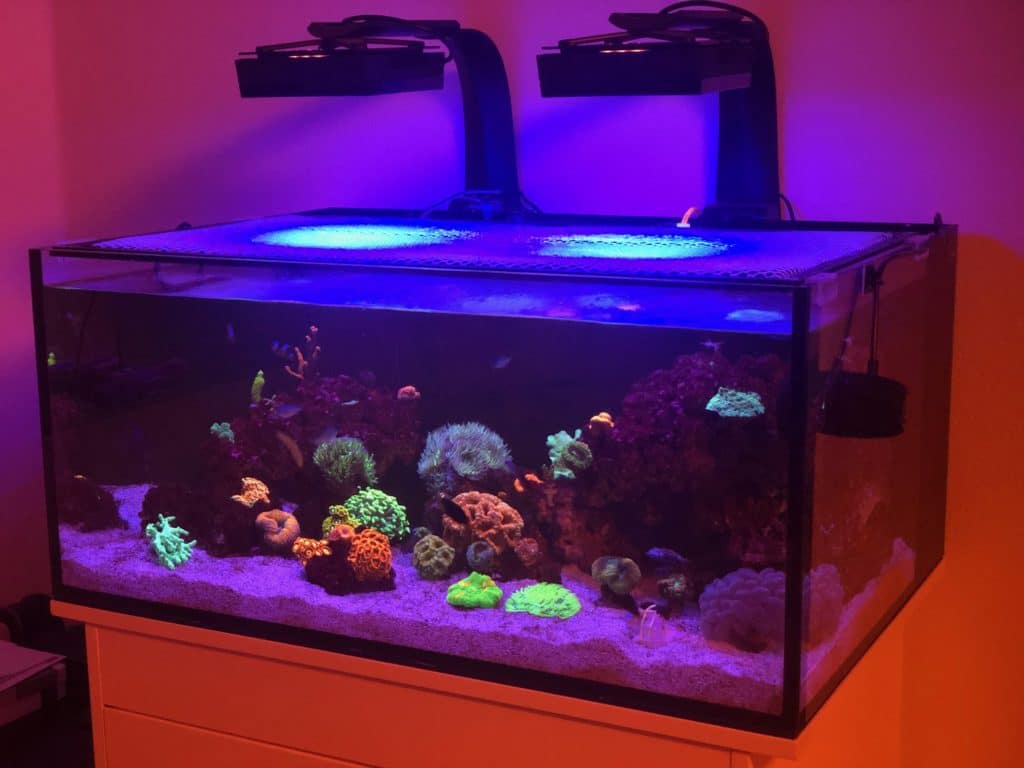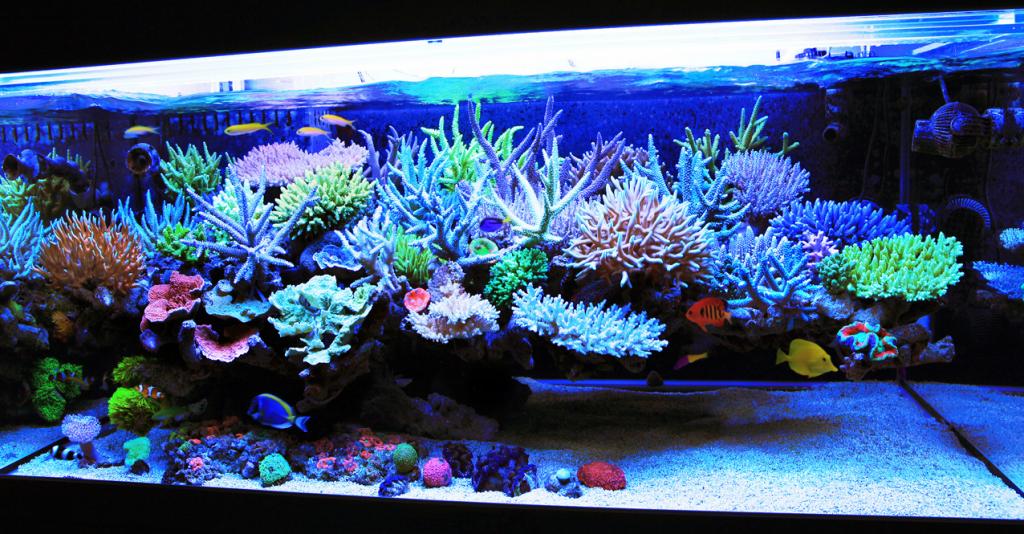Carbonate Hardness Reef Tank Ppm
Alkalinity meqL and dKH are exactly the same things when measured with an aquarium test kit. One dKH is equal to 1786 milligrams of calcium carbonate per liter of water.

Pin On Small Salt Water Aquarium
Carbonate hardness refers to the number of carbonates and bicarbonates that are dissolved in your aquariums water.

Carbonate hardness reef tank ppm. 25 meqL 7 dKH 125 ppm CaCO3 equivalents. Test procedure in the Lab is easy low concentrated hydrogen acid is. For animals a variation of only one point for example from pH 85 to pH 75 signifies a change in the level of acidity in the water by 10 times with a two point change that changes to 100 times.
The following chart is a general guideline of acceptable water parameter ranges for different types of tropical marine aquariums. Please note the following recommendations are rough guidelines only. The alkalinity carbonate hardness or KH is very important to buffer the.
25-4 meqL 7-11 dKH 125-200 ppm CaCO3 equivalents. General hardness indicates the amount of calcium and magnesium present in your aquarium. The most common unit that aquarists use is degrees carbonate hardness or dkH.
Add Proper pH 82 to increase carbonate hardness and stabilize the pH to 82. Blocks for corals to form their aragonite or calcite skeletons. 3 - 8 GH.
In a solution where only CO2 affects the pH carbonate hardness can be used to calculate the concentration of dissolved CO2 in the solution with the formula CO2 3 KH 107-pH where KH is degrees of carbonate hardness and CO2 is given in ppm by weight. Alkalinity is measured in degrees of calcium hardness or dKH. A lot of times customers are reading KH levels incorrectly at home.
The term carbonate hardness is also sometimes used as a synonym for temporary hardness in which. 4 - 12 GH. In the shrimp hobby shrimp are often kept with plants.
4 - 8 KH. Carbonate and bicarbonate are necessary for reef tanks because they help coral remain healthy and build a strong skeleton. Waters that have moderate to high levels 50 mgL or greater of total alkalinity and total hardness usually have a neutral to slightly basic pH.
Carbonate CO3 is also one of the major building. The consumption is usually disproportionately high at this point. Alkalinity aka carbonate hardness is a measure of CO3- in solution.
KH dKH - Carbonate Hardness is the waters buffering capacity or carbonate hardness. One dKH is equal to 179 mgL or 179 ppm. Candidate in biological.
In the aquarium hobby total alkalinity is typically referred to as carbonate hardness or KH which can also be measured in degrees dKH rather mgL or ppm. 12 - 20 GH. PH of your tank.
My new 75 gallon reef had a carbonate hardness of 17ppm the test kit says it should be 8-12 the test kit says there are ways to raise the hardness but nothing about lowering it is 17ppm ok. Lets look at the suggested ranges for different types of aquariums. KH is the carbonate hardness of the water whereas GH is the general hardness of the water.
If not how do I lower it it is a new tank 4 days old with 150lbs of live rock with a wetdry and a skimmer 200w power compact w a 250 MH on its way. I soon upgraded that tank and as they say the rest is history. If the level of pH is escalating you need to take the right measures to decrease the KH level to remedy it and to maintain the overall wellbeing of the tank.
Effects of High Alkalinity on a Reef Tank. Despite its name dKH refers to the total alkalinity of your tank water instead of the waters hardness at least in the context of aquarium keeping. It also sometimes measured in a different scale to degrees a conversion can be found here.
Calcium carbonate is also represented in reef tanks as parts per million ppm. Im currently a PhD. Converting from dKH to KH can be accomplished by multiplying by 1786.
Carbonate hardness is a measure of the concentration of carbonates such as calcium carbonate CaCO 3 and magnesium carbonate MgCO 3 per volume of water. Some times KH is confused with GH which is General Hardness. How does alkalinity level affect a reef tank.
Planted tanks often fluctuate in pH levels if there is no kH present in the water. Alkalinitys recommended range in parts per million would be between 125 and 200 ppm. Typical Surface Ocean Value.
The carbonate hardness level KH should be 7-10 dKH 125 179 mgL ppm to encourage growth in a reef aquarium and maintain pH. 12 - 20 GH. Use the Aquarium Pharmaceuticals KH Test Kit to measure the carbonate hardness.
Hi alk doesnt always translate into a high pH as your tank demonstrates. DKH German degrees of carbonate hardness ppm as CaCO 3 parts per million as CaCO 3. While the measurements can be listed as part per million PPM I prefer to use degrees of carbonate hardness dKH1 dKH is about equivalent to 179 ppm.
The higher degrees you water measures the more concentrated kH your water has. 4 - 12 GH. In high school I became particularly interested in coral reefs and set up my first reef tank in 2001--a modest 10 gal tank.
One unit of dKH is equivalent to 1786 ppm or 036 meqL. Convert alkalinity between milliequivalents-per-liter meqL meql carbonate hardness dKH KH and parts-per-million ppm. PH is a measure of hydrogen ions in solution.
Freshwater fish tanks definitely work best at these levels when it comes to KH and saltwater fish tanks are naturally higher in KH levels. In a tank perfectly equilibrated with the atmosphere it does but this is almost never the case in a home aquarium. They are just different units like inches and centimeters.
When setting up a new reef tank system the carbonate hardness is mainly consumed by the build-up of biofilms and precipitation in the system which is not yet completely stable. The carbonate hardness is consumed by various processes. In the aquarium industry total alkalinity may be referred to as carbonate hardness or KH which is often measured in degrees dKH rather mgL or ppm.
The ideal carbonate hardness KH levels should be at 45 65 or higher. Sometimes KH is known as total alkalinity or acid-neutralizing capacity ANC. KH stands for carbonated hardness which plays a major role in balancing the pH levels in the aquarium to prevent the tank from getting toxic for both fishes and live plants.
The measurement of KH is done by degrees and 1 degree being 179 parts per million PPM. Likewise is dKH the same as alkalinity. Experts express carbonate hardness in three ways.
If the value of the carbonate hardness should become around 2 dKH the pH value of a reef in the course of the day will fluctuate well outside the normal limits 79 to 84.
Reef Of The Month April 2019 Alexandrfeist Reef2reef Saltwater And Reef Aquarium Forum

Pin On Small Salt Water Aquarium

Liquagen 5 Stage Reverse Osmosis Deionization Ro Di Aquarium Reef Water Filter System 75 Gpd Https P Water Filters System Water Storage Saltwater Tank
Reef Spotlight Reef Of The Month April 2019 Alexandrfeist Reef2reef Saltwater And Reef Aquarium Forum

Water Quality For Reef Tanks Part 1 The Most Important Parameters Ati North America
Reef Of The Month April 2019 Alexandrfeist Reef2reef Saltwater And Reef Aquarium Forum
Testing Alkalinity In Your Reef Tank

How To Lower Alkalinity In Reef Tanks Nano Reef Adviser

How To Raise Alkalinity In Reef Tank Reef Craze

Reef Aquarium Water Parameters


Posting Komentar untuk "Carbonate Hardness Reef Tank Ppm"